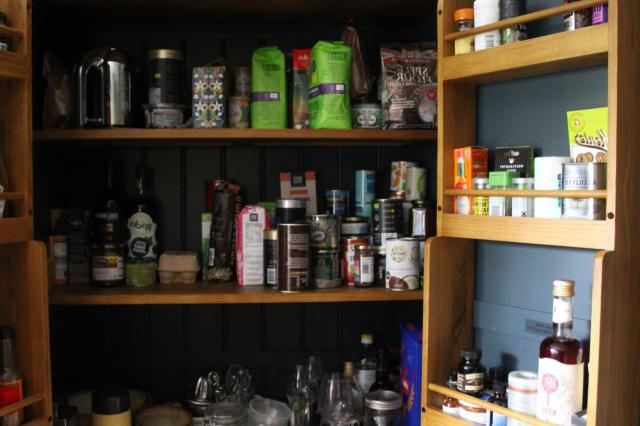A Pantry is meant for handy Food storage. Too many people clutter them up with unnecessary items that spoil, attract pests, might be dangerous, or just waste space.
Keeping some things out of the pantry is often just common sense. Others may come as a bit of a surprise.
- Safety. Spoiled food. Easy access for children.
- Clutter. Waste of space. Outdated food not used in a timely manner.
- Cost. Wasted food thrown out.
12 Things To Keep Out Of the Pantry
Attractive pantries are pleasant to look at. Easy to access, useful, and safe are even better.
Medicine
Pantries are usually easy to access for everyone in the house. Storing any type of medication where children can get to it is dangerous. This includes prescriptions, over-the-counter products, and even food supplements and vitamins.
Meat
Storing fresh meat anywhere but in the refrigerator or freezer leads to spoilage, waste, and possibly sickness. Even vacuum-packed and cured meat–like salami–needs to move to the refrigerator after opening. It is a good habit to never store any meat products in the pantry.
Eggs and Dairy
Eggs and dairy products last much longer in the refrigerator. Milk, cream, butter, and cheese spoil, get rancid, or moldy quickly if stored in the pantry.
Perishable Produce and Fruit
Root vegetables such as potatoes, onions, garlic, and rutabagas keep well in cool dark places but insects might become a problem. Pantries with doors and floor space work well. Most other produce lasts much longer in the refrigerator. Some fruit can be stored in the pantry but may attract fruit flies and other pests. When in doubt, keep anything that goes bad quickly out of the pantry.
Cleaning Supplies
Cleaning supplies or hazardous items like batteries, dishwasher pods, and paint products should never be stored in pantries. It is too easy for children and even some adults to mistake them for food.
Pet Food
Storing pet food in the pantry has too many bad outcomes–especially if it is open. Even in airtight containers, it attracts pests–roaches seem to really like it. The smell of pet food easily transfers to human food. Someone–usually children–can mistake it for food people eat.
Food In Opened Packages
Once a package of anything is opened, move it out of the pantry to avoid attracting bugs or having it spill. If something like rice or pasta must be kept in the pantry, transfer whatever remains into airtight plastic or glass containers.
Expired Food
Food past its “best before” date just takes up valuable space. It is not going to be eaten for safety or taste reasons. Rotate stored items and eat the oldest to save money or donate it to a food bank so someone gets some use out of it.
Opened Cans, Bottles, or Jars
Many product packages state, “Refrigerate after opening.” It makes sense to follow directions but sometimes it is just too easy to toss something on a pantry shelf. These products spoil much faster in the pantry. They can make people sick, attract bugs, and eventually be thrown out.
Whole Grain Flour and Sugar
Whole grain flour should be kept in the refrigerator because it will spoil quicker in the pantry. Sugar and white flour are OK in the pantry. Storing them in airtight containers extends their lifespan, preserves taste, and keeps bugs at bay.
Towels, Dishcloths, or Linen
Fabric that is rarely used like placemats, extra dishcloths, towels, or rags attract moths. There are such things as pantry moths that lay eggs in open food. Eggs hatch into larvae (small worms) that infest food as they eat and grow.
Non-Food Items
Most pantries are designed and used for food. Cluttering them up with seldom-used kitchen appliances, cookbooks, owners manuals, tools, lightbulbs, etc. is counter-productive. It creates less space for food storage and makes things harder to find.
Pantries are usually located close to the kitchen for convenience. Filling it up with excess food items because things were on sale or you prefer to be stocked up reduces the pantry’s usefulness. Excess items should be stored in spare rooms, closets, or basements in waterproof and pest-proof plastic containers. Food can be moved into the pantry as required.
Adblock test (Why?)
Powered by WPeMatico

